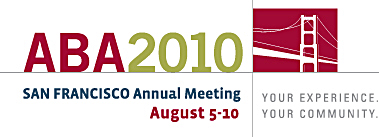





W. Cole Durham, Jr., Susa Young Gates Professor of Law and Director of the International Center for Law and Religion Studies at Brigham Young University, spoke at the 8 August 2010 afternoon session of the Annual Meeting of the American Bar Association in San Francisco. The topic of the session was "The First Amendment’s Religion Clauses: Universal Norm or Peculiarly American?" The session was co-sponsored by the General Practice, Solo and Small Firm Division, Government and Public Sector Lawyers Division, Section of Administrative Law and Regulatory Practice, and the Section of International Law. Other speakers at the session were Richard Foltin, Washington, D.C., and Tad Stahnke, New York.
From the Meeting Program Book (below), page 144: "Against the background understanding that there must be a universal base level of religious liberty rights for all individuals, this panel will discuss the question of whether the First Amendment’s Religion Clauses, as interpreted, should be approached as a template for universal human rights norms or as an expression of a particular, and peculiarly American, approach to protection of religious liberty. For instance, what are we to make of America’s historically sharper (if arguably fading) prohibition on government funding of religious institutions as compared to other countries, or, conversely, a generally accepted norm in this country that workers and students should be allowed to wear distinctive, religiously required garb in the workplace and at school, as opposed to a number of other countries? We will hear from American scholars and practitioners who deal with these issues from an American focus, as well as comparative law experts."
